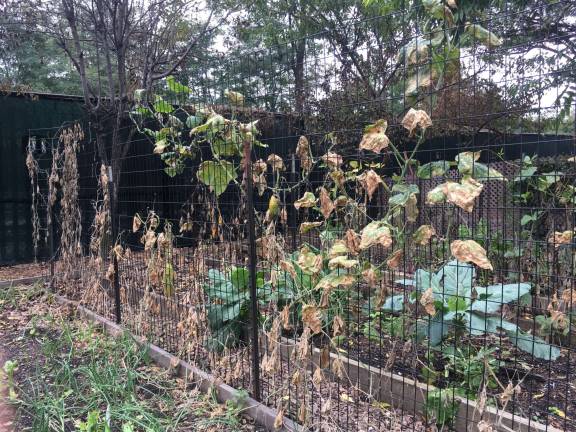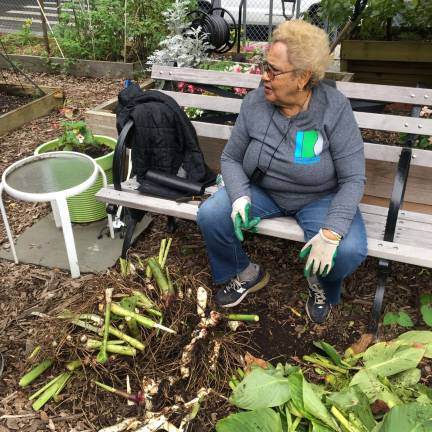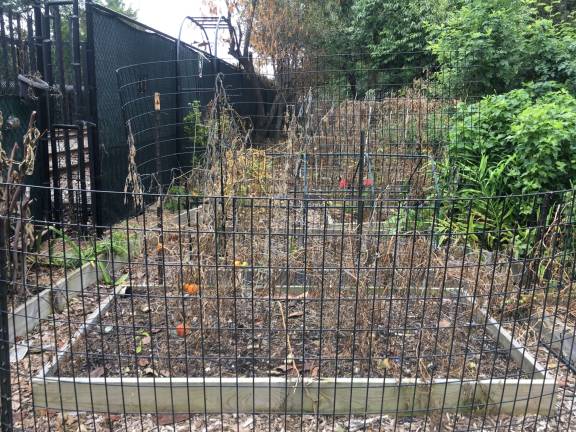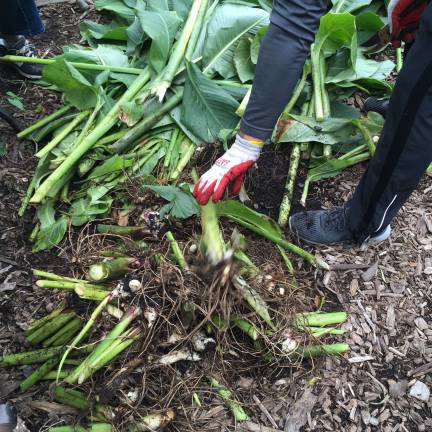pesticide application ravages garden




A pesticide application on the Amtrak right of way through West Harlem has ravaged a community garden off 138th Street just as its caretakers were readying a fall harvest destined for an Upper West Side soup kitchen.
Roughly half of the plantings at Jenny’s Garden, which abuts the railway at the westernmost end of 138th Street, were killed or severely damaged by the application on Sept. 15. Fig, peach, apple and pear trees were also damaged.
Jenny Benitez, who lives on Riverside Drive and started the garden nearly 50 years ago, was inspecting the coming harvest on Sept. 22 when she noticed that a 15-year-old fig tree’s leaves were browning and looking poor, said her daughter, Victoria Benitez. She then saw that plantings nearest the wire and mesh fence abutting the right of way were also ailing.
“It dawned on her that was happening was not natural,” Victoria Benitez said. “She called me in near hysterics because she didn’t know what had happened.”
Recalling that a similar but more minor incident happened about 10 years ago, also attributable to a pesticide application, Benitez called Amtrak. A company official initially told Benitez the company had no record of a recent spray. The Amtrak official later called to say that a pesticide application, by a contractor, had in fact taken place on Sept. 15.
In a statement, Amtrak said the company had investigated the incident through a site visit and would continue to assess the damage to the garden and to work toward a resolution.
“Amtrak assured Jenny’s Garden and the Parks and Recreation Department that Amtrak will work with its contractor to take care of the garden and leaf damage to some of the plants,” the statement said. The statement said the contractor had provided documents related to the incident to the city Parks Department.
Citing the company’s continuing investigation, the spokesman said Amtrak officials would not answer detailed questions about the incident, including about the types of chemicals used, any necessary permits and the extent of the pesticide application.
Benitez, though, said she was told that the application was of Bayer Viewpoint Herbicide, a so-called “broad brush” product used to curtail brush and invasive and noxious weeds, according the to the manufacturer’s webpage. The herbicide consists of the chemicals imazapyr, Aminocyclopyrachlor and Metsulfuron-methyl. The herbicide does not appear to be highly toxic to humans.
Garden volunteers had been preparing a harvest of eggplant, tomatoes, beans, cucumbers, squashes, grapes, and several varieties of greens designated for the soup kitchen at Broadway Presbyterian Church on West 114th Street, Victoria Benitez said.
“That entire harvest was destroyed,” she said.
The pesticide application also compromised a composting program and garden’s greenhouse, she said.
Victoria Benitez said the extent of the pesticide application, given the damage at the garden, was worrisome.
“I don’t know what that might be, but from the larger community aspect, do they have the right to do that — to spray caustic, probably dangerous pesticide — in a such a densely populated area of New York?” she asked.
Following the incident, local officials, including Mark Levine, who represents that portion of West Harlem on the City Council, were contacted by a longtime garden volunteer.
Borough President Gale Brewer and Levine then sent a letter to Amtrak CEO Richard Anderson denouncing the pesticide application, which was done apparently without notification.
The letter expressed concern for the health of people living in the neighborhood. The closest residences are on Riverside Drive, above the garden, and on the other side of an underpass on 138th Street, about 200 feet from the garden.
“This is not a responsible or acceptable practice in one of the nation’s densest urban environments,” the letter continued, adding that the garden had losses in the thousands of dollars.
The Riverside Park Conservancy’s president and CEO, Dan Garodnick, said he would pressure Amtrak to compensate for the loss.
“So many hours and the heart and soul of Jenny Benitez and her team go into caring for that space, which was simply destroyed in an instant by Amtrak,” he said. “That is not acceptable.”
Garodnick said Conservancy staff would assist garden volunteers starting Wednesday to dig up, dispose of and replace 3 to 4 inches of soil, as city Health Department officials have suggested. He said the Conservancy would pay for the soil and ask Amtrak for reimbursement.
In their letter, Brewer and Levine asked that Amtrak officials meet with garden representatives to discuss reimbursement. They also demanded that, moving forward, Amtrak provide a schedule for herbicide applications and the rail company’s notification protocols to residents and local governments. They also asked that notification of future sprays be sent to local elected officials and community boards 30 days before they are to take place.
On Sunday morning, Jenny Benitez, 86, was already looking forward to spring. She sat on a bench near the garden’s entrance, speaking to well-wishers and directing neighborhood volunteers taking care of the plantings.
“The garden is here still,” she said. “We’ll see you in April and May. We’ll have it ready.”